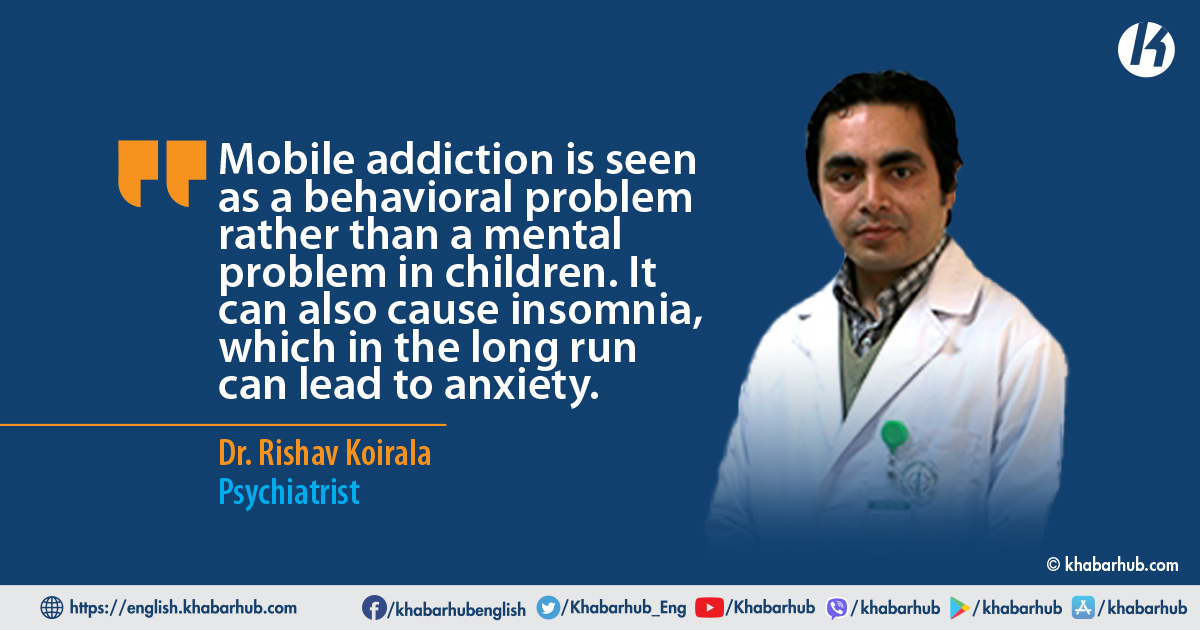0%

KATHMANDU: Increased use of smartphones by children is likely to affect their physical and mental health status.
In today’s global environment, technology has made great strides. Months after the birth of a child, video content is shown on the mobile phone to the baby even while feeding food.
This is a severe form of addiction.
This behavior gradually leads the child to “addiction”, and the result can be very harmful.
The trend of parents becoming busy with their mobile phones and engaging their children with videos on mobile sets can have a serious impact on the children’s minds as well as physical health.
Children’s mental illness on the rise
When parents do not have enough time for their children, this can have a negative impact on their wards.
A parent’s job is not just to raise a child. There are other aspects that need to be considered.
However, not all children undergo mental illness when parents do not spare time with their kids. This can, however, raise several problems. Sparing time off their busy schedule for their kids will have a special bonding.
Actions need to be taken and parents need to pay attention to their kids. If children are being abused, they can speak openly with parents who listen to their voices.
Otherwise, they start becoming negative toward their parents. Mental illness is more common in children without parents than with parents.
Try not to keep children in hostels
Do not force a kid to stay in a hostel. But some of the parents think that keeping a child in a hostel is a wise decision thinking that it would help in the studies of the child.
A child should be able to become a good individual by applying education, and children should be kept with their families during the learning period.
In school, teachers teach. But it’s the duty of the parents to show the goodness and the dos and don’ts. Children also imitate and learn from their parents.
How do we know mental problems?
Many people have a misconception that children do not have mental problems. Mental problems are thought to occur in elderly people.
However, a large number of mental problems begin in childhood. About 40 percent of the problems start in childhood.
Children with mental problems have different ways of expressing, and presenting.
Many children focus on playing rather than studying. If a student who is good at studies suddenly deteriorates, parents should try to understand the reason.
If a child starts getting angry and quarrels with his siblings or parents, it is important to understand the root of the problem.
This is seen as a behavioral problem rather than a mental problem in children.
Depression and anxiety do not need to be treated. However, some parents even take their children to the doctor.
How to treat?
Treatment of depression or anxiety is possible in Nepal. We have to explain to the doctors clearly.
The doctor advises at which level the problem is increasing. Medicines are not given at the beginning of mental problems.
If the problem starts getting worse, treatment should be started with various other counseling and therapy.
Some also develop severe balance disorders in childhood. If there is such a problem, medicine should be started. But in other cases, it may be fine without taking medicine.
How to get a consultation
A parent can consult about the problem in various places. One can discuss the problem with family members and experts.
What to do to prevent problems?
The most important point is that parents should give time to children. They should help children as much as they can.
Parents should take care of their kid’s studies, health, and even interest in sports.
Many children do not open up without being asked by their parents. They should be told about all the problems as they happen.
They understand even small problems deeply. They are also confused by the changes in their physical appearance.
This may also stress them out. Parents should not show fear and take time to understand their problems.
(Based on Bina Neupane’s conversation with psychiatrist Dr. Rishav Koirala)